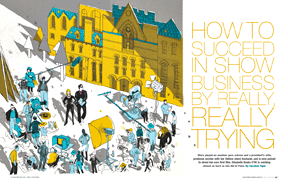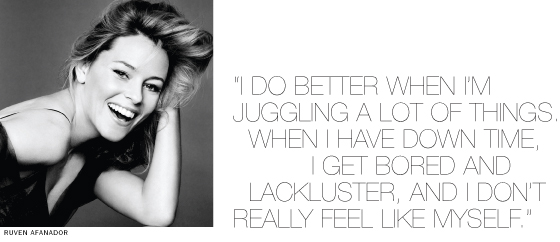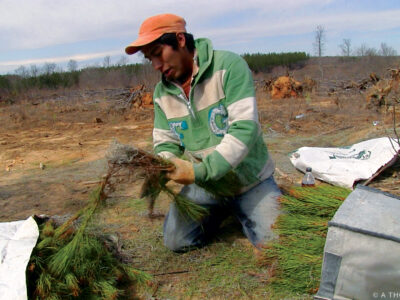
She’s played an amateur porn actress and a president’s wife, produces movies with her (fellow alum) husband, and is now poised to direct her own first film. Elizabeth Banks C’96 is working almost as hard as she did at Penn.
By Caroline Tiger | Illustration by Josh Cochran

The year is 1993. The setting is a double in the Tri-Delt sorority house on Penn’s campus. An alarm clock sounds around 6:00 a.m., rousing two sophomores. The one named Liz gets out of bed and makes her way to the bathroom to start her day. The one named Rebecca falls back to sleep. After getting dressed, Liz slinks through the silent house and out the door to her Faculty Club work-study job at an hour that, in college time, may as well be the dead of night.
Liz Mitchell C’96, who changed her name to Elizabeth Banks when she became an actress to avoid confusion with Elizabeth Mitchell of Lost fame, remembers Penn as a time of constant work. “I think I slept an average of three to four hours a night all four years I was there,” she says over the phone one November afternoon during a lunch break on the Pittsburgh shoot of The Next Three Days, the movie she’s filming with Russell Crowe. Her sophomore-year roommate and good friend, Rebecca Stewart C’96, now an anchor for Fox News in Hartford, Connecticut, remembers Banks left most days at 7 a.m. and didn’t return until 11:30 that night.
By sophomore year, Banks was running the work-study program at the Faculty Club—a choice gig that allowed her to keep up with the pulse of the school by dining with professors. Even better, the free lunches meant she didn’t have to spring for a full meal-plan. Banks also did catering and acted in a children’s theater group that performed for local schools. It was her first foray into extracurricular theater at Penn. Her first Penn role: playing Aunt Polly in a production of Tom Sawyer. Between rehearsal every night, work-study every day, going to classes, being in Delta Delta Delta, trying to have a social life, and doing all the class work necessary to graduate magna cum laude, it’s easy to see how Banks didn’t have much free time.
Life isn’t so different now, even if the 36-year-old has gained celebrity by starring in movies including The 40-Year-Old Virgin, The Uninvited, W, and Zack and Miri Make a Porno. Her packed schedule may include stints in Cannes, on various red carpets, and on the couches of Jay, Dave, Conan, Jimmy, and other talk show hosts, but she’s still working around the clock and taking little time off between projects. “I like being busy,” she says. “I do better when I’m juggling a lot of things. When I have down time, I get bored and lackluster, and I don’t really feel like myself.” It’s not the most unusual sentiment from a Penn grad, but according to Stewart, “In a sea of overachievers, Liz was a standout.”
Three years ago, Banks added producer to her resume when she and her husband, Max Handelman C’95, founded Brownstone Productions. She’s also occupied being the face of Loréal cosmetics, preparing for her first directing gig, and doing speaking engagements in support of A Woman is Not a Pre-existing Condition, a National Women’s Law Center initiative to persuade Congress to pass health-care reform legislation that includes affordable coverage and benefits for reproductive health.

When Elizabeth Maresal Mitchell first arrived in Philadelphia from her hometown of Pittsfield in western Massachusetts, she was well acquainted with hard work but not so much with city living. The small-town girl had never ridden in a taxi. Still, Banks wasn’t easily cowed. Stewart remembers befriending her one day early into freshman year when a group of hallmates in the Lower Quad was hanging out in someone’s room, and Banks started belting out Grease tunes.
Though she was theatrical on arrival, she didn’t plan on becoming an actor. She didn’t know exactly what she wanted to be, but Banks knew what she wanted to make: plenty of money. “I was itching to study theater, but I knew I didn’t want to be a starving artist,” she recalls. “That was not on the agenda for me.”
So how did someone so determined not to be an actor end up producing movies starring Bruce Willis and starring in movies opposite Russell Crowe? Growing up in Pittsfield, a working-class town where her mother was employed at a local bank and her father at the General Electric plant, Banks was a dedicated athlete until she broke her leg sliding into third base during a high school softball game. The teenager filled the ensuing void in her after-school schedule with acting.
Her first role was Pontius Pilate in Jesus Christ Superstar—the robe handily covered her cast. Banks’ high school theater teacher, Ralph Hamann, told their hometown paper, the Berkshire Eagle, “There were depths she revealed at an early age. I could say to her, ‘Liz, take the stage,’ meaning, the space is yours. She would know what to do, instinctively.” He recalled her star turn as Aldonza/Dulcinea in Man of La Mancha. During one performance, when an unfortunate combination of a thunderstorm and the opening of the auditorium’s air vents led to puddles on stage, she didn’t miss a beat.
Banks’ husband, Max Handelman, claims the critical moment occurred later, during her freshman year and his sophomore year at Penn. Soon after they met at an AEPi party and started dating, she was trying to choose between trying out for cheerleading or trying out for a play. Says Handelman, “I told her, ‘I can’t imagine dating a cheerleader so I think you should go for the play.’” He’s sort of kidding. Max and Elizabeth’s fateful meeting happened on her very first day of school. (Liz remembers the exact date: September 6, 1992.)
Handelman, on campus for Homecoming Weekend in November to screen Surrogates, a sci-fi thriller starring Bruce Willis and one of the first films he and Banks co-produced, recalls that long-ago moment. “The house had run out of beer so the party was pretty much over,” he says. “The brothers were kicking people out.” He spotted Liz in the sea of people gathered outside and noticed she was standing with a friend’s little sister. He grabbed that friend and said, “Let’s go talk to your sister.” The two started dating immediately. They married in 2003.
There was no talk of Hollywood when they were undergrads. “Liz is one of those people who could be good at so many different things,” Handelman says. “I had no idea she’d go on to become a celebrity, but it doesn’t surprise me that it happened.”
Banks’ designations as Homecoming Queen of Pittsfield High and magna cum laude graduate of Penn are a reflection of the versatility that’s characterized her acting career. She feels equally at home in a drama as she does in a comedy, even if she’s better known for her funny movies and regular appearances on TV’s Scrubs. She credits her part in 2001’s Wet Hot American Summer—a low-budget comedy that evolved into a cult film and ended up launching the careers of a number of comedic actors, including Paul Rudd, Michael Showalter, and Amy Poehler—for starting her down the comedic path. She played Lindsay, a camp counselor who makes out with lifeguard and future Banks’ co-star Rudd while a camper apparently drowns. That role helped land her a small but memorable role as one of Steve Carell’s potential first flings in The 40-Year-Old Virgin. Seth Rogen, who worked with her in Virgin, suggested Banks for the role of Miri in Zack and Miri Make a Porno. Directed by Kevin Smith, who first gained fame with the foul-mouthed but soft-hearted low-budget favorite Clerks, Zack and Miri concerns two longtime non-romantic friends who hatch a scheme to solve their money problems by putting their bodies to work and (surprise!) find themselves falling in love.
Talking to Banks on the phone, it’s easy to see how Rogen could envision her as Miri. Her quick, throaty (and now famous) laugh punctuates her real life conversation as frequently as it does her movie conversations, and she tends to tell it exactly like it is. According to friends, fame hasn’t changed the girl who was just as matter-of-fact and hilarious in college. “A lot of people do change and start to believe their own hype,” says friend Carineh Martin C’95, who worked at the William Morris Agency before segueing into luxury-brand marketing. “Not Liz. She has fun with it. It’s not lost on her that she’s at the Vanity Fair Oscars after-party, sitting next to Tom Ford and Uma Thurman.”
Combined with her Homecoming Queen beauty, that earthiness made her a favorite with the flock of writer/directors whose films feature man-children and the women who love them. Judd Apatow, the godfather of the latest wave of these comedies, whose other films include Knocked Up and last summer’s Funny People, cast her in Virgin; Kevin Smith in Zack and Miri; and David Wain in Wet Hot American Summer and 2008’s Role Models. Banks has no problem delivering the boys’ bawdy lines and embracing scenes like the one in Virgin where her sex-crazed bookstore clerk’s bathtub romp scares away Steve Carell.
When Zack and Miri came out, she explained her apparent lack of inhibitions to the L.A. Times: “Sex is ridiculous on all levels,” she said. “As a woman, I don’t see it as a big romantic thing. We have needs as human beings. I’m not a self-serious person in general, and I’m not somebody who believes that women have to uphold the code of morality for men.”
Despite flirtations with immorality, she claims to be a major goody two-shoes. “I’ve been in the same relationship with the same person for 17 years,” she points out over the phone from Pittsburgh, “so, you know, you don’t really get a reputation as being a wild woman.” She doesn’t lie. She’s never done drugs. She won’t run a yellow light. “This is all about how I was raised.” Maybe that’s why, where Rogen saw a fledgling porn star, Oliver Stone saw a buttoned-up first lady.
After seeing Virgin, Stone called her in to audition for the part of Laura Bush in W. He says he knew the moment he met her she was Laura. Banks had a giggle fit on the drive home from the audition—a reflection of her incredulity over such a surreal experience. She couldn’t believe Stone had handpicked her for the part. Stone sang her praises after the movie wrapped, saying he’d call her “Laura” on set because she embodied the role so completely. She has played plenty more dramatic roles: Jeff Bridges’ wife in Seabiscuit; the photojournalist daughter of a famous stage actress, played by Glenn Close, in the indie film Heights.
Her character in The Next Three Days is a prisoner who’s been wrongly accused of murder. You can usually tell which kind of movie she’s working on—drama or comedy—by the color of her hair. Appearing on Leno during the filming of Three Days, she pumps her brunette locks with one hand and tells Jay this is her “serious movie hair.”
Presumably that’s the hair she sported back at Penn for her serious interviews for jobs in fashion, finance, and consulting. With her grades, she didn’t have trouble getting interviews, but she was never very convincing. “The interviewer was constantly asking, ‘Are you sure you want to do this?’” she recalls. “‘Are you sure you want to work at McKinsey?’” Though she knew she wanted to make money to pay off her loans, she didn’t feel strongly about any of the careers that paid big bucks. She had no desire to study for the LSAT and much desire to continue acting. Her theater friends were applying to drama school so she followed suit, applying to NYU, Yale, and the American Conservatory Theater in San Francisco. “I loved school,” she says, “so the idea of more school appealed to me.” But the loans didn’t, and corporate job offers beckoned. Happily, her uncle encouraged her to pursue her dream and go to drama school, telling her, “These jobs will be here for you in two years.”
After graduating from ACT in 1998 with a masters degree, Banks immediately started acting in commercials for products like Dove soap, Crest toothpaste, and “alcopop” beverage Zima. She was focused on paying off those loans. Handelman, by then working for the investment bank and brokerage house Solomon Smith Barney, was transferred from New York to the firm’s Los Angeles office, and the couple began their West Coast life together. Banks worked steadily, dealing with the de rigueur rollercoaster of rejection and acceptance. Says Carineh Martin, “It’s a really challenging industry. It takes its toll on you mentally if you’re not a strong person with a strong foundation and sense of self.”
Before long the breaks started coming: her role in Wet Hot American Summer was followed by 2003’s Seabiscuit, a serious drama that was nominated for seven Academy Awards. In the summer of 2005, The40-Year-Old Virgin opened at #1 at the box office and turned out to be that year’s 19th top grossing film in the U.S. A lot of people saw it.
In 2008, when W, Zack and Miri, and Role Models—a “bromantic” comedy starring Paul Rudd and Seann William Scott in which Banks plays Rudd’s put-upon lawyer-fiancée—came out back-to-back, a rash of magazine and newspaper articles featured breathless interviews that revolved around two themes: “Elizabeth’s Golden Age,” touted Entertainment Weekly, portraying her as an actor on the brink of major stardom. The second theme: Who is Elizabeth Banks? A comedic actor or a dramatic one? Will she be branded one or the other based on these movies’ fate? The answer: Reply hazy, try again. All three films did respectably well, but none was a breakaway success. Banks continues to be offered both types of roles.
Which kind of actor would she like to be? She’s still wavering. “Look, I’d love to have a brand because brands make money. That’s one of the first things they teach you at Penn,” she points out. “Being branded is not a bad thing, I just don’t know if I’ve figured out what it is yet.” She says this between shooting scenes for the big action drama with Russell Crowe. “Frankly, I’m surprised I haven’t been doing more comedy. One reason my husband and I are developing movies is to develop comedies. That’s what we really like to make, it’s where a lot of our friendships lie, and it’s personally just a necessity because there are so very few movies for funny women.”
Still, her acting role models are Meryl Streep and Jodie Foster, not Julia Roberts. And she’s definitely interested in “serious movies.” According to Allison Brecker Shearmur C’85, president of production at Lionsgate, the studio behind Three Days, Banks actively pursued that role. “Her reading was undeniable—the passion, the emotion,” says Shearmur, but the actor’s campaigning was the x factor. She reached out to director Paul Haggis to express her interest. “Her entrepreneurialism and ambition kept Liz in consideration,” Shearmur says.
What seems to engage Banks most these days is storytelling, an interest that was nurtured at Penn, where she majored in communications with a concentration in theater arts. Digging deep into Shakespeare texts via Penn’s theater classes proved to be an essential foundation for an acting career. “It’s fascinating how many actors I meet who are not familiar with the classics, who are not familiar with basic storytelling,” she says, “who can’t tell the difference between a comedy and a drama, and who don’t know, for instance, that A Midsummer Night’s Dream is a comedy.”
These skills serve her well in many capacities—for example, when she’s collaborating on the script for Pitch Perfect, a Brownstone property in development that’s a comedy about a cappella groups (the type of people, says Handelman, he and Banks knew at Penn). They served her well when she accepted the part of Beth in Role Models, then took Beth from one- to three-dimensional by suggesting the arm-candy role be fleshed out by making her character into the lawyer needed in the script’s third act. These instincts for storytelling also come into play when she and her husband hunt for properties to acquire for Brownstone. “We have complementary skills,” says Handelman. “I like to be a strategic thinker. I like looking for material and asking, ‘Is there a movie here?’ Elizabeth is very good with the details of how to extract the compelling aspects of the story.”
Banks takes storytelling very seriously. “It’s a tradition that goes back to when we were living in caves and acting out the history of our people,” she says, “or when we’re teaching our children by telling them stories, or just as a way of trying to make sense of the world around us.” After 10 years in the movies, she’s realized that an actor is merely a cog in the storytelling machine. Actors struggle to craft perfect little moments—puzzle pieces that are then manipulated and fitted together by editors, effects, and ultimately the director.
Only the director has ultimate control (or the closest thing to it), which is why she’s eager to direct for the first time this January on a short comedic film produced by the Farrelly brothers, known for comedies like There’s Something About Mary and Dumb and Dumber. Shearmur, who knows about these things, predicts Banks will succeed as a director. “I think Elizabeth has an interest in the written word and a respect for writers and an insight into story that will make her a great producer and director,” she says. “Her interests lie in the total experience of the film, not in how it relates to her.”
It seems Banks has reached another turning point in her career. It’s a quieter moment than the W/Zack and Miri/Role Models triple-release in 2008, but maybe the fame generated from that wave will allow her the luxury to slow down, stop working so hard, and take some time to figure out what she really wants.
“I do want a little more control over telling stories,” Banks says. “I mean, I could totally bomb at directing. It could go horribly. But I will work very hard, like I always do. I’ll put in my best effort and hope that I have some talent for it.” So far, it’s been a winning formula.
Caroline Tiger C’96 is a freelance writer in Philadelphia and a regular contributor to the Gazette.




